
The Dark Side of Reform
The Dark Side of Reform
Exploring the Impact of Public
Policy on Racial Equity
Edited by
Tyrell Connor and Daphne M. Penn
LEXINGTON BOOKS
Lanham Boulder New York London
Chapter 2 was initially published in Volume 48, Book 3, of the Fordham Urban Law Journal and is republished with permission. Jefferson-Bullock, J and Jefferson Exum, J. (2021). That is Enough Punishment: Situating Defund the Police Within Antiracist Sentencing Reform. The Fordham Urban Law Journal, 48(3), 625.
Published by Lexington Books
An imprint of The Rowman & Littlefield Publishing Group, Inc.
4501 Forbes Boulevard, Suite 200, Lanham, Maryland 20706
www.rowman.com
6 Tinworth Street, London SE11 5AL, United Kingdom
Copyright 2022 The Rowman & Littlefield Publishing Group, Inc.
All rights reserved. No part of this book may be reproduced in any form or by any electronic or mechanical means, including information storage and retrieval systems, without written permission from the publisher, except by a reviewer who may quote passages in a review.
British Library Cataloguing in Publication Information Available
Library of Congress Cataloging-in-Publication Data
Names: Connor, Tyrell, 1987- editor. | Penn, Daphne M., 1986- editor.
Title: The dark side of reform : exploring the impact of public policy on racial equity / edited by Tyrell Connor and Daphne M. Penn.
Description: Lanham : Lexington Books, [2022] | Includes bibliographical references and index. | Summary: The Dark Side of Reform contains nine chapters on the development of social policies with the potential to advance racial equity. The volume also offers recommendations for implementing policies that address the unique concerns of structurally disadvantaged communities-with particular emphasis on Black and Latinx peopleProvided by publisher.
Identifiers: LCCN 2021053175 (print) | LCCN 2021053176 (ebook) | ISBN 9781793643759 (cloth) | ISBN 9781793643766 (ebook)
Subjects: LCSH: United StatesRace relationsPolitical aspects. | Racial justiceUnited States. | Civil rightsUnited States. | United StatesSocial policy.
Classification: LCC E184.A1 D2685 2022 (print) | LCC E184.A1 (ebook) | DDC 305.800973dc23/eng/20211203
LC record available at https://lccn.loc.gov/2021053175
LC ebook record available at https://lccn.loc.gov/2021053176
 The paper used in this publication meets the minimum requirements of American National Standard for Information SciencesPermanence of Paper for Printed Library Materials, ANSI/NISO Z39.48-1992.
The paper used in this publication meets the minimum requirements of American National Standard for Information SciencesPermanence of Paper for Printed Library Materials, ANSI/NISO Z39.48-1992.
Contents
Daphne M. Penn and Tyrell Connor
Daniel Semenza and Brian Wade
Jalila Jefferson-Bullock and Jelani Jefferson Exum
Emily Tucker
Angela S. Murolo
Jay Pearson
Janice A. Iwama
Niambi M. Carter
Candice C. Robinson, LaTeri McFadden, and J. Nicole Johnson
Charisse Southwell and Michael Hudson-Vassell
Tyrell Connor and Daphne M. Penn
The idea for this book originated from conversations between the volumes editors, who are the hosts and founders of the Black and Highly Dangerous (BhD) Podcasta show dedicated to disseminating scholarly research beyond the academy. The volume reflects a collective effort in which both editors equally engaged in the preparation of the bookfrom book proposal to final submission. Therefore, the editor order for the book cover and title page follows the conventional practice of listing names alphabeticallynot by contribution level. The author order for the introductory chapter, jointly written by both editors, is reversed. Finally, the naming sequence of the closing chapter was decided based on each authors contribution.
This volume would not have been possible without the thoughtful and brilliant authors who dedicated their time and expertise to producing informative, yet accessible, chapters on some of our nations most pressing policy issues. We are incredibly thankful for their contributions to this effort, especially given that these chapters were drafted, revised, and edited within the context of a global pandemic. We would also like to express appreciation for Lexington Books and our acquisition editorsCourtney Lachapelle Morales and Matthew Valadesfor providing us with the opportunity to develop and edit this volume.
Daphnes Acknowledgments
First and foremost, I would like to thank my spouse, John, for believing in my work, supporting me unconditionally, and encouraging me to remain steadfast in my academic pursuits. I would like to express gratitude to my family, who supported me in all of my endeavors. I feel incredibly blessed to have parentsIrving Penn, Myra Armstrong, and Elgin Armstrongwho encouraged me to see it through, despite the inevitable obstacles and challenges of life. I also appreciate my siblings, Dywana and DeWayne, for their constant reassurance and well-timed pep talks. For their prayers and inspiring words, I thank Dr. Mike Fonge and Anne Fonge as well as Dr. Takor Arrey-Mbi and Susan Arrey-Mbi. Additionally, I am grateful to the following people for being a source of encouragement, friendship, and laughter while writing and editing a book during a pandemic: Dr. Ashley Custard, Meya (Tidwell) Elijah, Dr. Hardeep Dhillon, Alexis Gaines, Dr. Jonathan Hampton, Valerie Herrera, Garry Mitchell, Valery Parham, Erishika Payne, Dr. Matthew Patrick Shaw, Dr. Renee Rinehart, Dr. Brook Dennard Rosser, and Dr. Andrea White. I am also incredibly grateful to Dr. Rich Furman, who not only helped me change my mindset and habits around writing but also provided me with concrete guidance that enabled us to successfully publish this edited volume. Along those lines, Im thankful to my editor, Jane, for pushing me as a writer. Additionally, I thank my mentors, Drs. Roberto G. Gonzales and Marty West, for their continued support. Last, but certainly not the least, I would like to thank the fly lady writers, especially Drs. Sa-kiera T.J. Hudson, Brielle Harbin, and Jamil S. Scott, who motivate me to write, strive, and thrive. I am confident that, with the continued support and wise counsel of my family, friends, mentors, and colleagues, anything is possible. Please note, if I failed to acknowledge anyone, I ask that you charge it to my headdefinitely not my heart.
Tyrells Acknowledgments
This volume would not have been possible without the encouragement and support of my wife, Krystin. Her words of affirmation and excitement fueled my desire to complete this volume during a global pandemic. Additionally, my lovely daughter, Maya, provided me with a new sense of purpose and makes everyday special with her infant smiles, giggles, and curious personality. I would like to express deep gratitude to my parents, Cornelius and Francine, for laying the foundation that allowed me to pursue my passions and thrive throughout life. Also, my brothers, Jamaar and Andre, have always been my personal comedians and continue to provide timely laughs and heartfelt joys. Finally, I would like to pay homage to our ancestors who fought and sacrificed so that future generations of Black Americans can live in a world stronger, wiser, and free. We share this volume to continue that mission.
Daphne M. Penn and Tyrell Connor
Over the past 10 years, there has been a growing appetite among Americans for the government to take active steps to address persistent inequality and improve peoples lives through transformative economic and social policy (Jones & Saad, 2019). Indeed, for the first time in nearly three decades, the majority of Americans believe that the government should do more to solve the nations problems (Brenan, 2020) by increasing the social safety net (Barry et al., 2020) and ensuring basic living standards (Cusick, 2021). Across party lines, voters increasingly support progressive economic and social policies, such as increasing the federal minimum wage, strengthening unemployment benefits, establishing a national medical and paid family leave program, offering higher levels of food assistance to families in need, and developing a universal health insurance program (Barry et al., 2020; Cusick, 2021; Manchester, 2018).
Next page
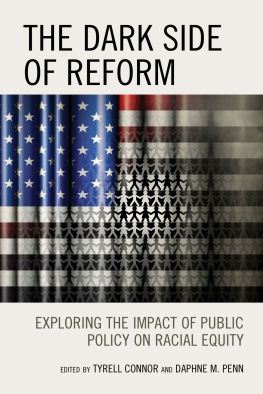


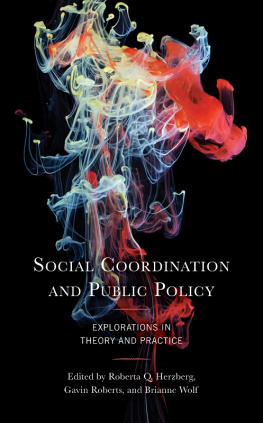
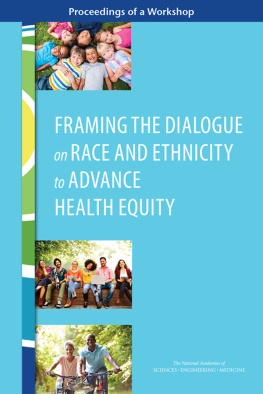

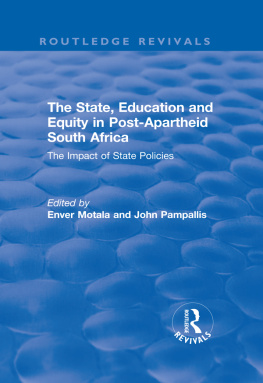
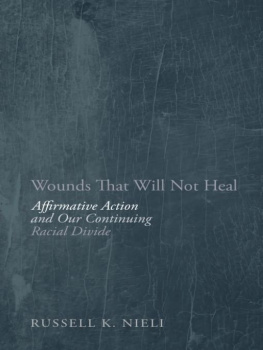
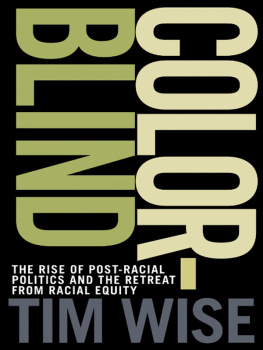

 The paper used in this publication meets the minimum requirements of American National Standard for Information SciencesPermanence of Paper for Printed Library Materials, ANSI/NISO Z39.48-1992.
The paper used in this publication meets the minimum requirements of American National Standard for Information SciencesPermanence of Paper for Printed Library Materials, ANSI/NISO Z39.48-1992.